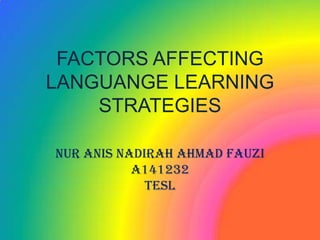
Factors affecting LLS
- 1. FACTORS AFFECTING LANGUANGE LEARNING STRATEGIES NUR ANIS NADIRAH AHMAD FAUZI A141232 TESL
- 3. •Motivated students are tend to be more creative in creating the strategies of learning and ways of using it . •Ellis (1994) said : Effort done by the student in learning second languange from the need and desire to learn the languange . •They will try to enhance their skills on the languange .
- 5. •Having a positive way of thinking towards the new languange will absolutely helps you in order to be succeed in the languange . •Positive attitude also resulted in great skills which will be develop through the process of learning . •Gardner and Miller(2002) said : learners bring their beliefs , goals , attitudes and decisions into learning and these influence how they approach their learning.
- 6. 3. AGE
- 7. •The differ of age actually influence the strategies use to learn . For example , primary students and secondary students . • If we see roughly , for sure we will says that secondary students will probably have better strategies than primary students . • Some of the reasons are : - their maturity of thinking - their longer duration of learning - wider knowledge of languange •However , primary students also can be more successful than secondary students if they are expose more towards the languange by their family or relatives .
- 9. •This factor discuss about the role of family , relatives , peers and ourselves too . •When the family , relatives and peers are together in helping each other to be successful in the languange , the relations itself will be more closed . •For example , the family is using the languange as daily conversation languange at home . So automatically the student will be more confident to speak in the languange as he/she already have a lot of practices to enhance his/her speaking skill . •The peers themselves actually have a very large influence on their friends . So if one of them is starting on doing notes , mindmaps or exercises , the others will also attracted to do the same things .
- 10. 5. GENDER
- 11. •As all of us know , girls or women become matured earlier than boys or men includes their thinking styles . • However , there are no specific research on effect of gender on their languange learning strategies . •But from various research that have been conducted , female are found to be more likely use the metacognitive strategies . • Apart from that , male is actually tend to use more languange learning strategies than female do usually .
- 12. THE END